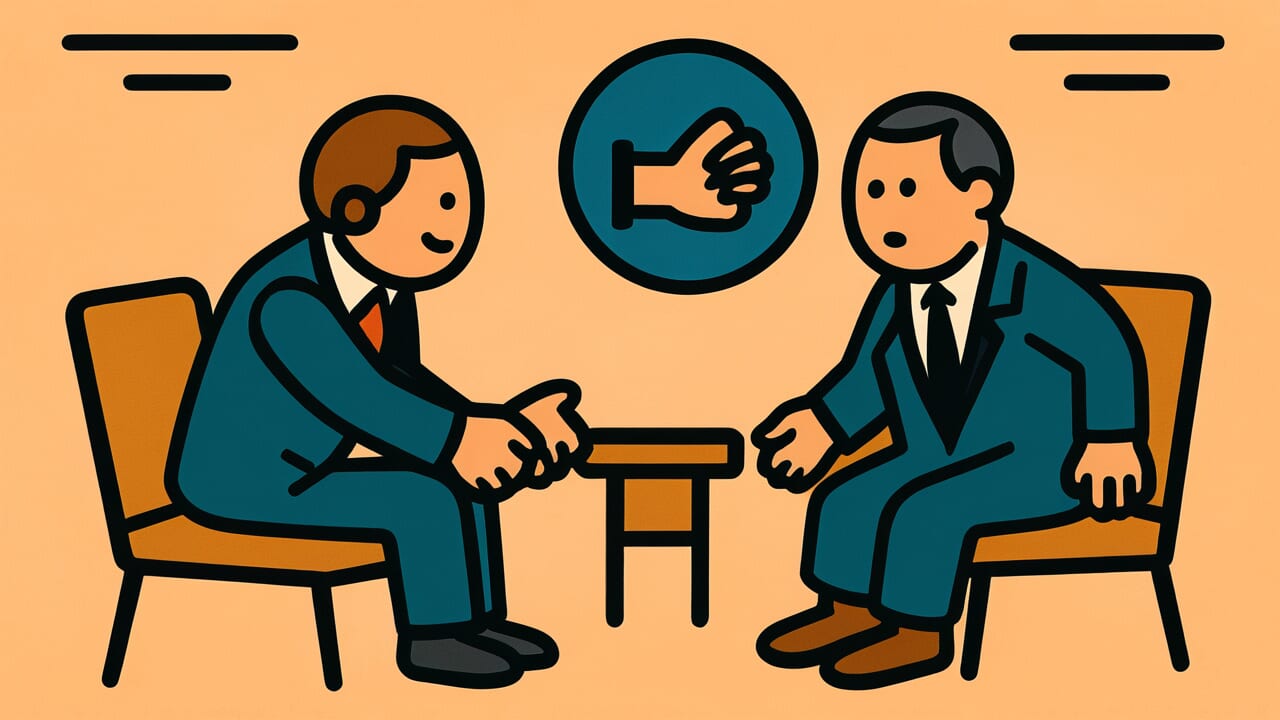How to Read “Consult even with your knees”
Hiza tomo dangō
Meaning of “Consult even with your knees”
“Consult even with your knees” means that no matter how close you are to someone, you still need to properly consult and discuss things before making decisions.
By saying you should consult even with your knees, which are part of your own body, the proverb teaches that careful communication is especially important with people you’re close to.
This saying applies to relationships with family, close friends, and longtime work partners. It warns against assuming you know what others think or moving forward without their agreement just because you’re close.
In fact, precisely because a relationship is intimate, respecting the other person, listening to their opinions, and building consensus are the secrets to maintaining trust.
Even today, this spirit remains important when making household decisions or plans with close friends.
Origin and Etymology
No clear written records explain the origin of “Consult even with your knees,” but we can make interesting observations from how the phrase is constructed.
The “knees” are part of your own body, the closest and most inseparable presence imaginable. “Dangō” (consultation) means discussion or deliberation, a method of decision-making that has long been important in Japanese society.
This proverb likely emerged from the culture of decision-making in Japan’s group-oriented society. It reflects values that emphasize thorough discussion with stakeholders rather than proceeding based solely on individual judgment.
By using even your own knees as an example of a consultation partner, the proverb emphasizes how important it is to properly consult about everything, no matter how trivial, and with everyone, no matter how close.
The logic goes: if you need to consult even with your knees, which are part of your body, then consulting with other people goes without saying.
This expression method represents a characteristic rhetorical technique in Japanese proverbs. By presenting an extreme example, it highlights the essential point.
It memorably conveys the lesson that you must never skip discussion just because of closeness or familiarity.
Usage Examples
- Even though we’re married, “consult even with your knees,” so let’s discuss big purchases together before deciding
- You’re my best friend, but “consult even with your knees,” so we need to properly discuss our travel plans
Universal Wisdom
The proverb “Consult even with your knees” contains deep insight into human relationships. Why did our ancestors teach that we should carefully discuss things especially with those closest to us?
Because they knew that carelessness born from intimacy is the greatest factor in destroying relationships.
The closer people become, the more they fall into the illusion that the other person thinks and feels the same way they do. Assumptions like “they should understand without me saying” or “they’ll forgive this much” gradually cause us to lose consideration for others without realizing it.
Many serious conflicts between family members and close friends arise from this “complacency due to closeness.” Because we care about someone, we take their feelings for granted.
Because we have affection, we neglect to confirm things. Our ancestors sharply understood this contradictory aspect of human nature.
True trust is not built by assuming you understand someone. It grows by continuously listening to their voice.
No matter how long the relationship, people’s hearts keep changing. Yesterday’s answer may not be the same today.
That’s why maintaining dialogue even with presences as close as your knees is the secret to keeping relationships healthy and long-lasting.
When AI Hears This
When observing human decision-making, I notice that the brain doesn’t actually make judgments alone. For example, during long hours of standing work, the knees send signals saying “time to rest soon,” and this information influences decision-making.
This isn’t a dictatorial system where the brain unilaterally commands. It’s a distributed system where each part provides information to one another.
In modern AI research, “multi-agent systems” where multiple small intelligences cooperate have been proven to make better judgments than one giant intelligence. It’s like an expert committee where each specialist brings information from their field.
The knees are both “distance-from-ground sensors” and “fatigue measurement devices.” Real-time data from the field called knees, which the brain alone cannot know, improves the quality of decision-making.
What’s interesting is that when you ignore the knees and judge with only the brain, the entire system becomes more prone to failure. When athletes ignore discomfort in their knees and suffer major injuries, it’s precisely the result of ignoring “reports from field agents.”
This proverb captures the essence of system design: optimal decision-making requires not just a central command center, but dialogue with information providers at the periphery.
Lessons for Today
What this proverb teaches modern people is that closeness and consideration must never be inversely proportional.
In contemporary society, “understanding without words” is often idealized in relationships with family, partners, and close friends. But the more important the relationship, the more you need to continue careful dialogue.
Precisely because we live in an era when smartphones make contact easy, we must consciously create time to face each other and talk properly.
A practical tip is to develop the habit of asking “What do you think?” even about small decisions. Dinner menus, weekend plans, minor schedule changes.
This daily accumulation shapes an attitude of respecting others.
Also, don’t take silence or “either is fine” at face value. Make the effort to draw out true feelings.
Because you’re close, the other person might be holding back or trying to accommodate you.
Don’t take your relationships with important people for granted. Continue the dialogue today and tomorrow.



Comments